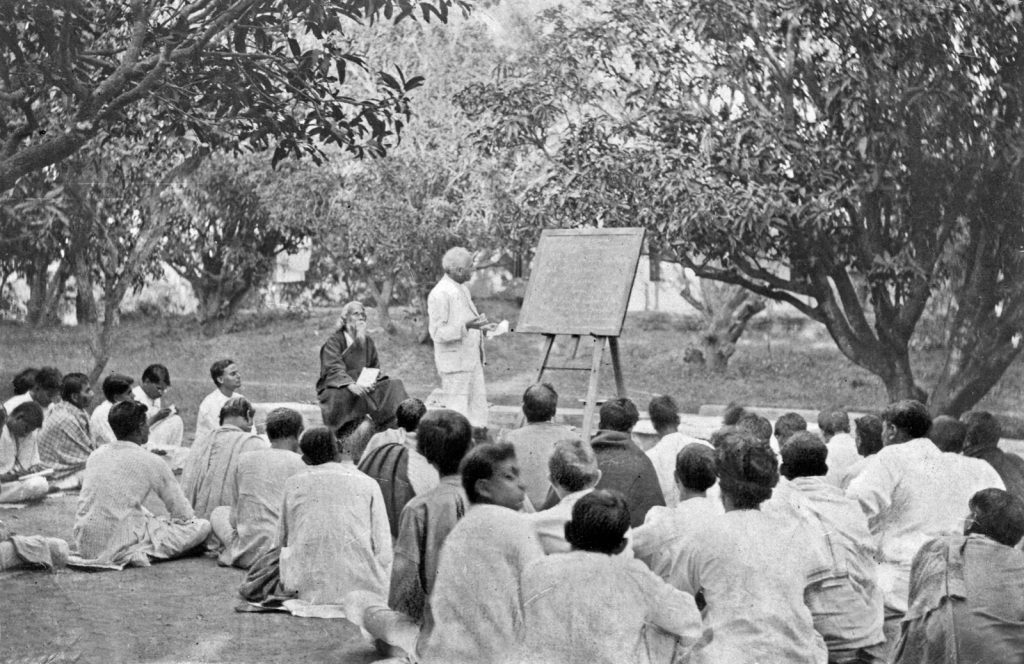“The kind of unity that the European Civilization has opted for is discord-centered; the kind of unity that Bharatavarshiya Civilization has opted for is concord-centered.”
– From ‘The history of Bharatvarsha’ by Rabindranath Tagore

The article from which the above quote is taken reminds us to stay grounded in an Indian perspective when we try to make sense of our Indian history. I hope the extracts given below encourage you to read the full article.
Extract 1: The history of India that we read and memorize for our examinations is really a nightmarish account of India. Some people arrive from somewhere and the pandemonium is let loose. And then it is a free-for-all: assault and counter-assault, blows and bloodletting. Father and son, brother and brother vie with each other for the throne. If one group condescends to leave, another group appears, as if, out of the blue; Pathans and Mughals, Portuguese and French and English together have made this nightmare ever more and more complex.
But if Bharatavarsha is viewed with these passing frames of dreamlike scenes, smeared in red, overlaid on it, the real Bharatavarsha can not be glimpsed. These histories do not answer the question, where were the people of India? As if, the people of India did not exist, only those who maimed and killed alone existed.
Extract 2: However, while the lands of the aliens existed, there also existed the indigenous country. Otherwise, in the midst of all the turbulence, who gave birth to the likes of Kabir, Nanak, Chaitanya, and Tukaram? It was not that only Delhi and Agra existed then, there were also Kasi and Navadvipa. The current of life that was flowing then in the real Bharatavarsha, the ripples of efforts rising there and the social changes that were taking place, the accounts of these are not found in our history textbooks.
Extract 3: What is the chief significance of Bharatavarsha? If a precise answer to this question is sought, the answer is available. And the history of Bharatavarsha upholds that answer. We find that a single objective has always been motivating Bharatavarsha. This objective has been to establish unity among diversity, to make various paths move towards one goal, to experience the One-in-many as the innermost reality, to pursue with total certitude that supreme principle of inner unity that runs through the differences. It has also been her endeavor to achieve these without destroying the distinctions that appear in the external world.
Extract 4: It needs talent to make outsiders one’s own. The ability to enter others’ beings and the magic power of making the stranger completely one’s own, these are the qualities native to genius. That genius we find in Bharatavarsha. Bharatavarsha has unhesitatingly entered other’s beings, and has effortlessly accepted things from others. Bharatavarsha has not discarded anything and has made everyone her own after accepting him or her.
Extract 5: Amongst the civilizations of the world Bharatavarsha stands as an ideal of the endeavor to unify the diverse. Her history will bear this out. Amidst many travails and obstacles, fortunes and misfortunes, Bharatavarsha has been seeking to experience the One in the universe as well as in one’s own soul and to place that One in the variegated, to discover that One through knowledge, to establish that One through action, to internalize that One through love, to exemplify that One through one’s own life. When through the study of her history we would be able to realize this everlasting spirit of Bharata, then the rupture of our present with the past will disappear.
The full article is available here. Let me know what you think.